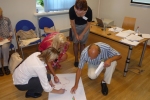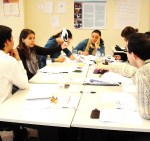 Aims
Aims
The CESSIT course intends to:
• promote the importance of lifelong learning for adult trainers.
• improve pedagogical approaches of adult educators and the attractiveness and effectiveness of adult training.
• diminish adult educators resistance to the daily use of new pedagogical methods and tools.
By participating in the courses you will also have the opportunity to meet other European professionals interested in promoting the development of creative skills and entrepreneurial spirit among their learners
Methodology
The course in organized in 6 modules and the effective training time is 25 hours. The modules are delivered by experienced international trainers. Given the objective of the course, its target group and thematic covered; the methodology applied includes various techniques to actively involve course participants.
Besides being presented with the theoretical aspects of each topic, the participants will have a chance to “test” numerous games, pedagogical methods and interactive techniques designed to promote creative skills and entrepreneurial spirit.
Support materials
• Handouts from keynote speakers
• Hard-copy of the Guidebook for Adult Trainers and Managers
• CESSIT DVD
Language of course
• English
Certification
Certificate of attendance including description of training content and time input will be provided.
Programme (day by day)
Monday:
Welcome session and introduction of participants
Module 1: The Role of Creativity (3 hours)
Set of activities to introduce the creativity and its role in people’s life
Evaluation of the module
Tuesday:
Module 2: Tools for improving creativity at work (6 hours)
Out of the box
Mind mapping
Brainstorming
635 method
6 thinking hats
Method DO IT
Evaluation of the module
Wednesday:
Module 3: Developing creative skills (2 hours)
Inductive and deductive thinking
The use of metaphors
Associations and abstractions
Evaluation of the module
Module 4: Entrepreneurial Spirit (4 hours)
Introduction to Entrepreneurship
Barriers to entrepreneurial spirit
Evaluation of the module
Thursday:
Module 5: From the idea to the result (5 hours)
Idea generation
Communication
Personal entrepreneurial spirit development plan
Evaluation of the module
Friday:
Module 6: Actions for the Future (5 hours)
How to promote creativity in educational contexts – case studies
How to promote entrepreneurial spirit in learners – case studies
Evaluation of the module
Evaluation of the course by participants / Closure
Social Program
Fee (Accommodation and meals): 550 €
Fee (Tuition and materials): 700 €
Cancellation Fee: 120 €
Cancellation rules:
In case any inconvenient may arise and avoid applicants to participate, they will notify it within at least 15 days before the beginning of the course (letter of commitment to be signed by participants). After this deadline the applicants will pay the cancellation fee
Contact
Rui Monteiro
ruimonteiro@spi.pt
Tel.: +351 22 607 64 00
Fax.: +351 22 609 91 64
More Information:
http://ec.europa.eu/education/trainingdatabase/index.cfm?fuseaction=DisplayCourse&cid=33235





